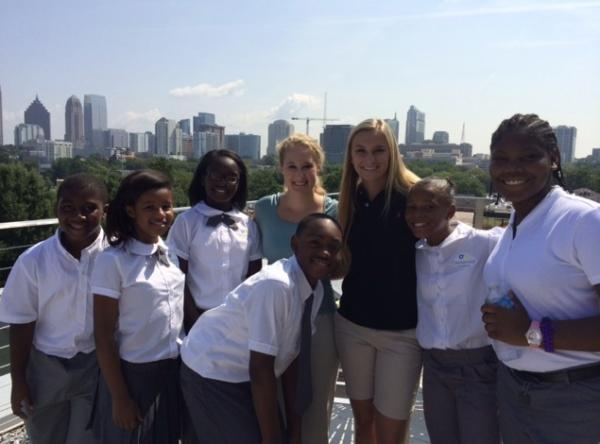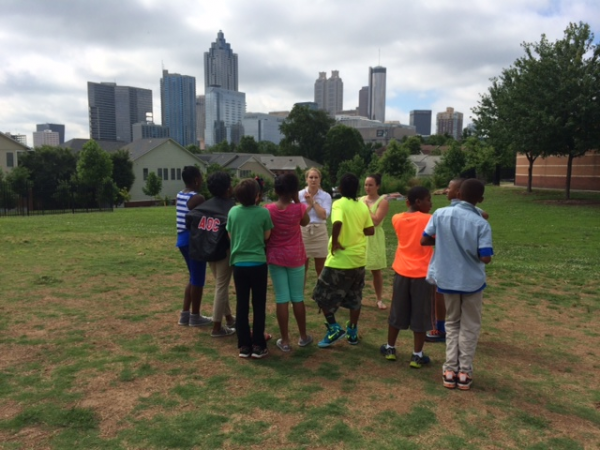Krissy Jeffares, Erika Loupee, and Emilee Roberts are not new to the world of problem-based learning — or “PBL” as they call it casually. In fact, this teaching model is standard operating procedure in their Georgia Tech classes. This summer, though, the three biomedical engineering students found themselves in a PBL puzzle as part of both the problem and the solution. Interning at Centennial Academy, they were brought in to run a test class with nine rising sixth-graders that used PBL in place of a more traditional teaching format.
The school, which this year began the process of transitioning from Centennial Place Elementary to a K-8 charter school, is leaving behind some of the restrictions of public school operation and hoping to incorporate elements of problem-based learning into its pedagogy in all grade levels.
“We wanted to see what we could learn from the kids and bring to the teachers,” said Roberts, a fourth-year student from Tifton. “It also helped the students learn about PBL and how it works. They’ll be kind of like ambassadors to the other students this year.”
The three enthusiastic women — all former Tech cheerleaders — were considered action researchers by Centennial, giving them both internship and research experience as part of their undergraduate curriculum. They spent the first half of the summer teaching the subject of earth science and used the remaining weeks to gather and analyze data, then put together presentations and recommendations for Centennial’s faculty.
They also were able to compare what they learned as teachers and researchers to their own experience as students.
“You have to do a little more traditional teaching with PBL with younger students, as opposed to how you would in a college class,” Roberts said, pointing out that critical thinking skills aren’t fully developed until around sixth grade. “The kids adapted much easier than we anticipated, though. Their progress in only 12 days of instruction was astounding.”
Before their experience at Centennial Academy, all three women had some prior interest or experience in working with children, but they hadn’t necessarily considered education as a career. Now, they’re considering how they can use their engineering background and skills to improve the education system.
“When you think about it from an engineering standpoint, education is a process that needs to be optimized,” Loupee said. After working at Centennial and teaching test prep classes for Princeton Review, she knows what it’s like to be in the classroom but also knows there are areas beyond the classroom that need an engineer’s mind.
“It’s possible there are other places we could be more beneficial to the system,” she said.
Jeffares is now planning to work pre-teaching classes into her coursework at Tech. Loupee is taking two pre-teaching classes this fall and has already completed Tech’s contemporary education course.
“The education classes at Tech are great,” she said. “They’re not just about grades K-12 — you get an inside view of your own education.”
Loupee graduates in December, but Jeffares and Roberts have more time to figure out their path. Jeffares could see herself working in a school’s math, science or engineering lab, all of which exist at Centennial Academy. Roberts hopes to use her background to recruit more women into STEM, and perhaps education, by showing you can find balance as a female in these fields — particularly at Tech.
“We can be girly girls but still love engineering,” she said. “You get that at Tech, but I don’t know that it’s something you get nationwide.”
All three encourage other Tech students of any major to venture across the street to gain work experience at Centennial Academy. Past pre-teaching interns have also come from the College of Sciences and the Ivan Allen College of Liberal Arts.
“It’s a huge benefit to have both schools right here,” Loupee said. “You can get experience while also fulfilling the needs of Centennial. There are so many opportunities here for Tech students.”
The pre-teaching program also offers internships at Grady High School. More information on pre-teaching opportunities is available at preteaching.gatech.edu.
Media Contact
Susan Belmonte
Pre-Teaching
Kristen Bailey
Institute Communications
Keywords
Latest BME News
Jo honored for his impact on science and mentorship
The department rises to the top in biomedical engineering programs for undergraduate education.
Commercialization program in Coulter BME announces project teams who will receive support to get their research to market.
Courses in the Wallace H. Coulter Department of Biomedical Engineering are being reformatted to incorporate AI and machine learning so students are prepared for a data-driven biotech sector.
Influenced by her mother's journey in engineering, Sriya Surapaneni hopes to inspire other young women in the field.
Coulter BME Professor Earns Tenure, Eyes Future of Innovation in Health and Medicine
The grant will fund the development of cutting-edge technology that could detect colorectal cancer through a simple breath test
The surgical support device landed Coulter BME its 4th consecutive win for the College of Engineering competition.









